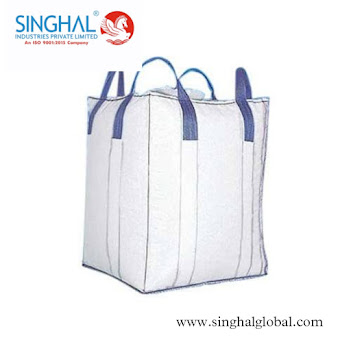Exploring the Versatility of FIBC Bulk Bags: An In-Depth Overview
Introduction:
FIBC (Flexible Intermediate Bulk Container) bulk bags, also known as big bags or jumbo bags, have become indispensable in various industries for their ability to efficiently store and transport large quantities of materials. In this guide, we will delve into the uses, features, applications, manufacturing process, suppliers, and manufacturers of FIBC bulk bags, with a focus on Gujarat, India.
Uses and Applications:
FIBC bulk bags serve a multitude of purposes across different sectors:
- Bulk Material Handling: They are widely used for transporting and storing bulk materials such as grains, chemicals, minerals, fertilizers, and construction aggregates.
- Packaging: FIBC bags are employed for packaging powders, granules, and other loose materials in industries such as agriculture, pharmaceuticals, and food processing.
- Waste Management: They are utilized for collecting and disposing of industrial waste, recyclables, and hazardous materials.
- Construction: FIBC bags find applications in the construction industry for transporting and storing materials like sand, gravel, and cement.
Features:
FIBC bulk bags offer several features that make them ideal for handling and transporting bulk materials:
- High Load Capacity: They are capable of carrying large quantities of materials, typically ranging from 500 kg to 2000 kg or more.
- UV Resistance: FIBC bags can be treated with UV stabilizers to withstand exposure to sunlight during outdoor storage or transportation.
- Dust and Moisture Protection: They provide excellent protection against dust and moisture, ensuring the integrity of the contents during transit and storage.
- Various Filling and Discharge Options: FIBC bags can be equipped with different types of filling and discharge options, including spouts, baffles, and discharge spouts with closures.
- Customizable: These bags can be customized with features such as lifting loops, document pouches, and printing of company logos or product information.
Manufacturing Process:
The manufacturing process of FIBC bulk bags involves the following steps:
- Material Selection: High-quality polypropylene (PP) or polyethylene (PE) fabric is selected for the body of the bag, along with suitable materials for the lifting loops and other components.
- Weaving: The selected fabric is woven into flat or circular tubular panels using specialized weaving machines.
- Cutting and Sewing: The woven panels are cut to the desired dimensions and sewn together using high-strength industrial sewing machines to form the body of the bag.
- Attachment of Components: Lifting loops, spouts, baffles, and other components are attached to the bag according to customer specifications.
- Printing and Labeling: The bag may undergo printing or labeling processes to add product information, logos, handling instructions, and safety warnings.
- Quality Control: Finished bags undergo rigorous quality control checks to ensure they meet industry standards for strength, durability, and safety.
1 Ton Bag Manufacturers in Gujarat:
Gujarat, a leading industrial state in India, hosts several manufacturers specializing in the production of 1-ton FIBC bags. Singhal Industries - Manufacturer of Flexible Packaging products - a leading 1 Ton Bag Manufacturers in Gujarat utilize advanced technology and adhere to stringent quality standards to produce high-quality bags for various industries.
Bulk Bag Manufacturers in Ahmedabad:
Ahmedabad, the commercial capital of Gujarat, is home to numerous manufacturers engaged in the production of bulk FIBC bags. Bulk Bag Manufacturers in Ahmedabad cater to the diverse packaging needs of businesses across different sectors, offering customized solutions and timely delivery.
FIBC Bags Manufacturers in India:
In addition to Gujarat, several manufacturers across India produce FIBC bags to meet the growing demand for bulk packaging solutions. FIBC Bags Manufacturers in India offer a wide range of bag sizes, designs, and specifications to cater to diverse industry requirements.
Conclusion:
FIBC bulk bags play a crucial role in the efficient handling, transportation, and storage of bulk materials across various industries. With their high load capacity, UV resistance, and customizable features, FIBC bags offer a versatile and cost-effective solution for businesses involved in bulk material handling. The presence of manufacturers in Gujarat and Ahmedabad underscores the significance of FIBC bags in meeting the packaging needs of businesses in India and beyond.
FAQ:
Q1. Can FIBC bulk bags be reused?
A1. Yes, FIBC bulk bags can be reused multiple times, provided they are properly inspected, cleaned, and maintained between uses.
Q2. Are FIBC bulk bags recyclable?
A2. Yes, FIBC bulk bags are recyclable and can be recycled along with other polypropylene or polyethylene materials to minimize environmental impact.
Q3. What are the different types of FIBC bulk bags available?
A3. FIBC bulk bags are available in various types, including standard bags, conductive bags, UN-certified bags, food-grade bags, and ventilated bags, each designed for specific applications and requirements.
Q4. How are FIBC bulk bags transported and stored?
A4. FIBC bulk bags can be transported using forklifts, pallet jacks, or overhead cranes and stored in warehouses or outdoor storage areas on pallets or racks.
Q5. What are the safety precautions to consider when using FIBC bulk bags?
A5. When using FIBC bulk bags, it's essential to follow safety guidelines for lifting, stacking, and transporting to prevent accidents or injuries. Ensure proper handling, inspection, and disposal of damaged or worn-out bags to maintain workplace safety.

.png)
.jpg)
Comments
Post a Comment